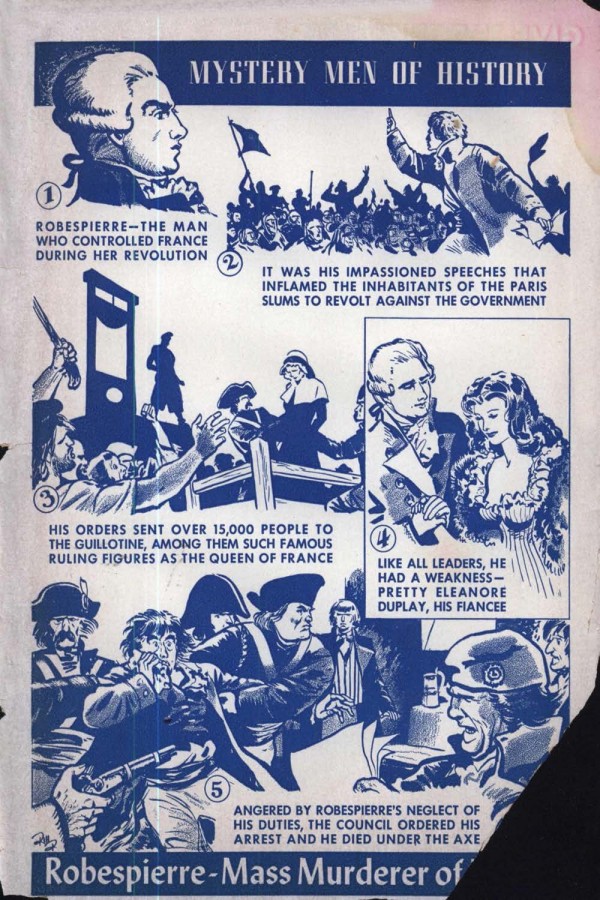
Help via Ko-Fi
ROBESPIERRE...
MASS MURDERER OF FRANCE
During the bloody days of the French Revolution the name of Robespierre was on everyone's lips. Women looked at his frigid mask of a face and regarded it as handsome as that of a Greek God; men idolized him as well. And there were many more who lived in utter terror of him.
This man was born in Arras, France, in 1758, the son of a local judge. In school he proved to be a very thorough and ambitious student winning a much-sought scholarship to a college in Paris where he studied law.
Robespierre was slow to make friends. He was awkward and provincial among the dandies of Paris. His personal conduct always remained above reproach. Day after day he rose early, dressed with care, devoted himself to his studies, and in the evenings submerged himself in the writings of Rousseau.
Inwardly he was the most gentle of men. Appointed as criminal judge in the diocese of Arras in 1782, he was unable to carry out his duties. In order to avoid pronouncing the sentence of death, Robespierre resigned his post.
Had Robespierre lived in other than revolutionary times, his imprint on history might have been entirely different. But in those hectic turbulent days be emerged a fanatic of the most dangerous sort. To this day his actions and the reasons prompting them remain shrouded in mystery.
Robespierre believed in the doctrines of Rousseau on the rights of man. He was convinced that Rousseau's doctrines would regenerate France.
He was in Versailles in 1780, at the meeting of the States-General. While the Constituent Assembly drew up a constitution, Robespierre turned from the Assembly of provincial lawyers and wealthy bourgeois to the people of Paris. He spoke frequently in the Constituent Assembly and was eventually recognized as a leader of a small body of the extreme left.
When be instinctively felt he was making little headway in the Assembly, he turned to the Jacobins, a group of extremists. Although he was a poor speaker and uncomely in appearance, he had the power of appealing to the instincts and emotions of the masses to stir them to hatred. Soon his voice was heard above all the others of the Revolution urging the inhabitants of the Park slums to avenge themselves for centuries of oppression and maltreatment.
Robespierre stepped in after the Bourbon king and queen were overthrown and became a member of the Commune of Paris. He was much too shrewd to identify himself openly with the first outbreak of violence. But from behind the scenes he helped spread that panic which swept over France when the attempted flight of the Royal Family, the organization of an army of refugees in the Rhine region, and rumors of fifth column activities among the remaining nobles had begun to make people expect to find a spy around every corner and a traitor in their neighbor's horde.
Danton was intrusted with the duty of carrying through the program of wholesale murder and execution, while the virtuous Robespierre kept his hands clean of the sordid business. Like Robespierre, the young Danton realized that the Revolution could not be won without the support of the slums of Paris. But that was as far as their friendship went. They hid the knives they hoped some day to stick into each other's back.
Robespierre was chosen by the Convention of the Committee of Public Safety and made his hearers believe that the system of the Terror was a necessary thing. "All traitors must die!" he proclaimed, and the distaste for killing he once possessed seemed to be buried now.
In 1793 Paris ruled France, and Robespierre held Paris in the palm of his hand. The Committee of Public Safety continued in its work of liquidating the opposition. More than 15,000 people were done away with. In October the queen was beheaded. It was during this period of his career that he decided the services of Danton were no longer needed and secretly pulled the strings which arranged the man's arrest and execution.
After Danton was removed from the scene, Robespierre attempting to banish the insecurity of his position, increased the pressure of the Terror. The cobblestones of Paris rang loud with the clatter of prison carts on their way to the guillotine. On June 10 even the appearance of justice was laid aside. No witnesses were allowed at the trials, and people were done away with secretly.
As the terror-filled days rolled by the lawyer from Arras grew confident. His decisions called for more deliberation now than formerly. His mind was fastened more often on the pretty Eleanore Duplay, whom he intended to marry, than on matters pertaining to government.
It was not long before the Convention lost patience with him and rose in revolt, but the Parisian mob remained loyal. Robespierre planned to issue a proclamation to the masses calling for their support, and friends expected this move to strengthen his position. Before Robespierre's name was penned to the appeal, soldiers and gendarmes under the orders of the Convention had forced their way into his room. A few hours later his neck was severed on the guillotine.
--Alexander Blade
